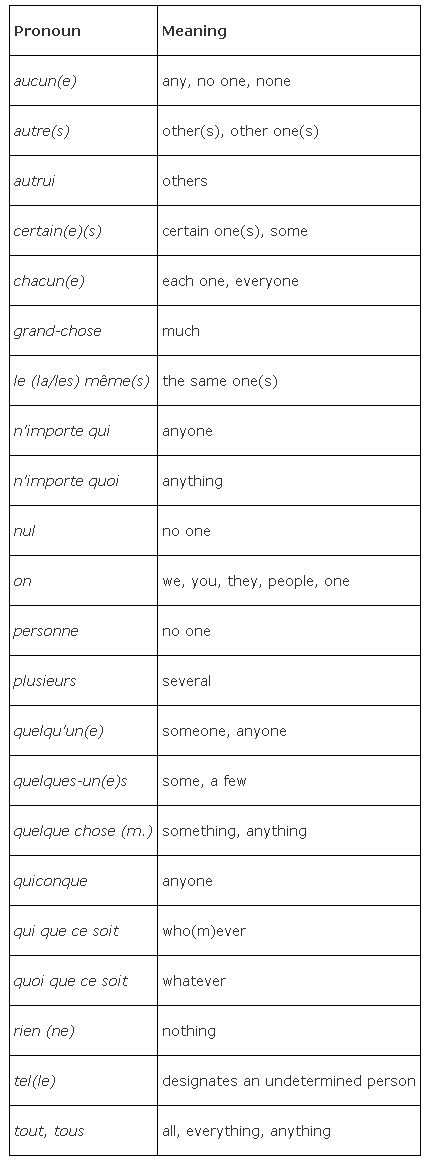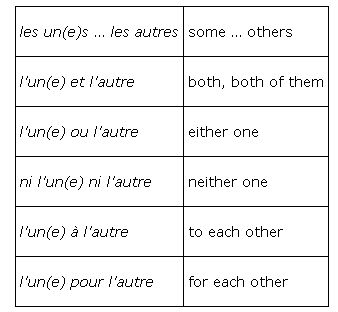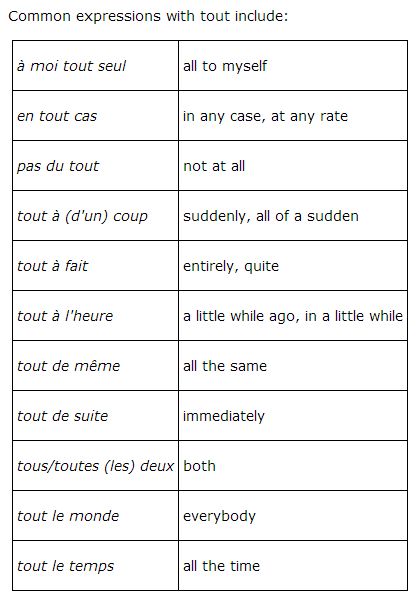The most commonly used indefinite pronouns are shown in the following list.

Aucun(e)
As a pronoun, aucun(e) may stand alone or be followed by de + noun or pronoun + ne:
- Je n'ai lu aucun de ces romans. (I haven't read any of those novels.)
- Aucune de ses amies n'est arrivée. (None of her friends have arrived.)
- Quelle voiture as‐tu choisie? Aucune. (Which car did you choose? None.)
Autre(s)
An article precedes autre when it is used as a pronoun. The indefinite article used with autres is d':
- Luc est parti. Les autres sont restés. (Luke left. The others remained.)
- J'ai perdu mon parapluie, mais j'en ai d'autres. (I lost my umbrella, but I have others.)
The following expressions with autre are used to show reciprocal action, especially with reflexive verbs:
- l'un(e) l'autre (each other)
- les un(e)s les autres (one another [of more than two])
Here they are in sentences:
- Ils s'aident l'un l'autre. (They help each other.)
- Elles s'aident les unes les autres. (They help one another.)
Autre is used in the following expressions:

For example:
- Les uns chantent; les autres dansent. (Some sing; others dance.)
- Elles sont arrivées l'une et l'autre. (They both arrived.)
- Montrez‐moi l'un ou l'autre. (Show me either one.)
- Je n'aime ni l'un ni l'autre. (I don't like either one.)
- Elles téléphonent l'une à l'autre. (They call each other.)
- Ils travaillent l'un pour l'autre. (The work for each other.)
Note the expression autre chose, which means “something else”:
- Donnez‐moi autre chose, s'il vous plaît. (Please give me something else.)
Autrui
Autrui is generally used in a literary context and is used most frequently after prepositions:
- Respectez le bien d'autrui. (Respect the property of others.)
Certain(e)(s)
As a pronoun, certain is used only in the plural. For clarification, d'entre nous, d'entre vous, d'entre eux, or d'entre elles may be added:
- Certains n'ont pas encore commencé. (Some haven't started yet.)
- Certains d'entre vous termineront vos études cette année. (Some of you will finish your studies this year.)
- Certains d'entre nous ont reçu de bonnes notes. (Some of us received good grades.)
- Certaines d'entre elles voulaient partir. (Some of them wanted to leave.)
Chacun(e)
Used only in the singular, this indefinite refers to individuals. The stressed pronoun soi is used with chacun(e):
- Chacune fait de son mieux. (Everyone does her best.)
- Chacun pour soi. (Every man for himself.)
Grand-chose
Note that there is no agreement of the adjective grand with the feminine word chose:
- Je n'ai pas grand‐chose à te dire. (I don't have anything much to tell you.)
Le (la/les) mêmes is used as a pronoun in order to identify something or someone or to insist on the permanence of something, as follows:
- C'est le même. (It's the same one.)
- Les mêmes coûtent cent dollars. (The same ones cost $100.)
- Ce sont toujours les mêmes qui préparent le repas. (It is always the same people who prepare the meal.)
- Ma mère? Elle est toujours la même. (My mother? She is always the same.)
N'importe qui
N'importe qui requires de before an adjective:
- Je parlerai à n'importe qui. (I'll speak to anyone.)
- Je parlerai à n'importe qui d'intelligent. (I'll speak to anyone intelligent.)
N'importe quoi
N'importe quoi requires de before an adjective:
- Je peux faire n'importe quoi. (I can do anything.)
- Donnez‐moi n'importe quoi de froid. (Give me anything cold.)
Nul
Nul is invariable as a pronoun and the negative is implied. Nul has the same sense as personne (personne is favored in informal situations).
- Nul ne sait cette chanson. (Nobody knows that song.)
On
The subject on refers to an indefinite person or persons (no antecedent is mentioned) and is always followed by a verb in the third person singular (the il form). On may have many different translations depending on the meaning intended. When the passive is used in English, French often uses on + an active construction. The possessive adjectives for on are son, sa, and ses. On is frequently used in a question to ask for a suggestion. The stressed pronoun soi is used with on. For the sake of pronunciation, l'on often replaces on before monosyllabic words ending in a pronounced vowel sound: et (and), ou (or), où (where), and si (if):
- On ne doit en faire qu' à sa tête. (One should do as one pleases.)
- On va au cinéma? (Shall we go to the movies?)
- On ne doit pas toujours penser à soi. (You should not always think of yourself.)
- Si l'on veut, on peut tout faire. (If you want to, you can do anything.)
Personne (ne)
Personne is always singular and considered to be masculine even if it refers to a woman. Depending upon the context of the sentence, personne may mean “no one” or “anyone.”
- Elle est plus gentille que personne. (She is nicer than anyone.)
- Il n'écoute personne. (He listens to no one.)
- Personne n'est arrivé. (Nobody has arrived.)
- Qui est arrivé? Personne. (Who has arrived? No one.)
Plusiers
Plusieurs is invariable and is always plural. Plusieurs may be followed by d'entre eux or d'entre elles for clarification:
- Il en a plusieurs. (He has several of them.)
- Plusieurs d'entre elles sont très gentilles. (Many of them are very nice.)
Quelqu'un(e) and quelques-un(e)s
Quelqu'un(e) is used in the singular and quelques‐un(e)s is used in the plural. The pronoun en is used when quelques‐un(e)s is used as a direct object:
- Quelqu'un a sonné à la porte. (Someone rang the bell.)
- Quelques‐unes de ses amies travaillent en ville. (Some of his [her] friends work in the city.)
- Il m'a donné quelques‐uns de ses bonbons. (He gave me some of his candies.)
- Il m'en a donné quelques‐uns. (He gave me some of them.)
Quelque chose (m.) and rien (ne)
These two pronouns are opposite in meaning. De precedes the adjective that refers to quelque chose or rien. Rien can stand alone or be used with the negative ne:
- Tu cherches quelque chose? (Are you looking for something?)
- Tu cherches quelque chose de spécial? (Are you looking for something special?)
- Non, je ne cherche rien. (No, I'm not looking for anything.)
- Qu'est‐ce que tu cherches? Rien (de spécial). (What are you looking for? Nothing [special]
Quiconque
Quiconque is the equivalent of n'importe qui or personne:
- Elle ne veut recevoir d'ordres de quiconque. (She won't receive orders from anyone [anybody].)
- Je comprends mieux que quiconque. (I understand better than anyone [anybody].)
Qui que ce soit
Qui que ce soit refers only to people and is the equivalent of “whoever” or “anyone”:
- Il a interdit à qui que ce soit de parler. (He forbade anyone to talk.)
Quoi que ce soit
Quoi que ce soit refers only to things and is the equivalent of “whatever” or “anything”:
- Si tu révèles quoi que ce soit à qui que ce soit, tu le regretteras. (If you reveal anything at all to anyone at all, you will regret it.)
Tel(le)
Tel(le) is used in the masculine or feminine singular:
- Tel vous dira qu'il faut travailler dur pour réussir. (One will tell you that you have to work hard to succeed.)
- Tel qui rit vendredi, dimanche pleurera. (You can be laughing on Friday but crying by Sunday.)
- Telle vous dira qu'il faut voter oui, telle autre vous dira qu'il faut voter non. (One [woman] will tell you to vote yes, the other will tell you to vote no.)
Tout and tous
Tout, used in the singular, always takes the masculine form. Although in English we may refer to “all of them,” de is never used with tout. In compound tenses, tout precedes the past participle:
- Tout est bien qui finit bien. (All's well that ends well.)
- Tous étaient absents. (Everyone was absent.)
- Les cartes? Je les ai toutes. (The cards? I have all of them.)
- Ces films? Nous les avons tous vus. (Those films? We saw all of them.)
Note the use of tout with ce qui and ce que:
- J'ai besoin de tout ce qui est sur la table. (I need everything that is on the table.)
- J'ai besoin de tout ce que vous avez dans ce sac. (I need everything you have in that bag.)
|

For example:
- Je te verrai tout à l'heure. (I'll see you in a little while.)
- Il est tout à fait content. (He is completely happy.)
- Je fais de mon mieux tout le temps. (I always do my best.)
Note that tout le monde is a collective noun and, as such, uses the third person singular (il form) of a verb:
- Tout le monde vient à ma soirée. (Everybody is coming to my party.)